
A Letter to Three Wives is a 1949 American romantic drama that tells the story of a woman who sends a letter to three women, saying she has left town with one of their husbands without revealing which one. It stars Jeanne Crain, Linda Darnell, Ann Sothern, Paul Douglas, Kirk Douglas, and Jeffrey Lynn. Thelma Ritter as "Sadie" and Celeste Holm have key supporting roles.

Sir Reginald Carey "Rex" Harrison was an English actor. Harrison began his career on the stage in 1924. He made his West End debut in 1936 appearing in the Terence Rattigan play French Without Tears, in what was his breakthrough role. He won his first Tony Award for Best Actor in a Play for his performance as Henry VIII in the Broadway play Anne of the Thousand Days in 1949. He returned to Broadway portraying Professor Henry Higgins in My Fair Lady (1956) where he won the Tony Award for Best Actor in a Musical.

Gene Eliza Tierney was an American film and stage actress. Acclaimed for her great beauty, she became established as a leading lady. She was best known for her portrayal of the title character in the film Laura (1944), and was nominated for an Academy Award for Best Actress for her performance as Ellen Berent Harland in Leave Her to Heaven (1945).

Edward Mulhare was an Irish actor whose career spanned five decades. He is best known for his starring roles in two television series, The Ghost & Mrs. Muir and Knight Rider.

Joseph Leo Mankiewicz was an American film director, screenwriter, and producer. Mankiewicz had a long Hollywood career, and won both the Academy Award for Best Director and the Academy Award for Best Adapted Screenplay in consecutive years for A Letter to Three Wives (1949) and All About Eve (1950), the latter of which was nominated for 14 Academy Awards and won six.
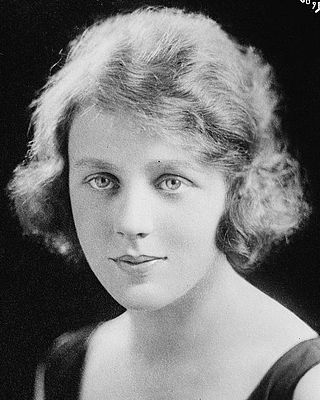
Edna Clara Best was a British actress.
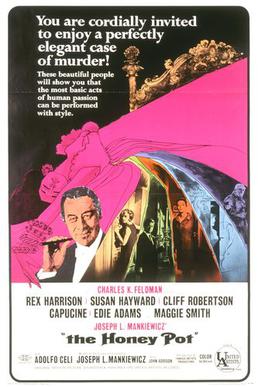
The Honey Pot, also known as The Honeypot, is a 1967 American crime comedy-drama film written and directed by Joseph L. Mankiewicz. It stars Rex Harrison, Susan Hayward, Cliff Robertson, Capucine, Edie Adams, and Maggie Smith. The film was based on the play Mr. Fox of Venice by Frederick Knott, the novel The Evil of the Day by Thomas Sterling, and loosely on the 1606 play Volpone by Ben Jonson.

Unfaithfully Yours is a 1948 American screwball black comedy film written and directed by Preston Sturges, and starring Rex Harrison, Linda Darnell, Rudy Vallée and Barbara Lawrence. The film is about a jealous symphony conductor who imagines three different ways to deal with the supposed infidelity of his beautiful wife—murder, forbearance, and a suicidal game of Russian roulette—during a concert of three inspiring pieces of classical music. At home, his attempts to bring any of his fantasies to life swiftly devolve into farce, underscored with humorous adaptations of the relevant music. Although the film, which was the first of two Sturges made for Twentieth Century-Fox, received mostly positive reviews, it was not successful at the box office.
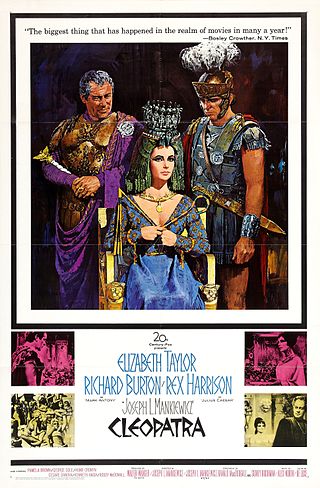
Cleopatra is a 1963 American epic historical drama film directed by Joseph L. Mankiewicz, with a screenplay adapted by Mankiewicz, Ranald MacDougall and Sidney Buchman from the 1957 book The Life and Times of Cleopatra by Carlo Maria Franzero, and from histories by Plutarch, Suetonius, and Appian. The film stars Elizabeth Taylor in the eponymous role. Richard Burton, Rex Harrison, Roddy McDowall, and Martin Landau also appear in major roles. It chronicles the struggles of Cleopatra, the young queen of Egypt, to resist the imperial ambitions of Rome.
George Davis was an American art director and was the supervising art director at MGM from 1959 to 1970. He won two Academy Awards for Best Art Direction for his work on The Robe in 1954 and for The Diary of Anne Frank in 1960.

Reta Shaw was an American character actress known for playing strong, hard-edged, working women in film and on many of the most popular television programs of the 1960s and 1970s in the United States. She may be best remembered as the housekeeper, Martha Grant, on the television series The Ghost & Mrs. Muir and as the cook, Mrs. Brill, in the 1964 film Mary Poppins.
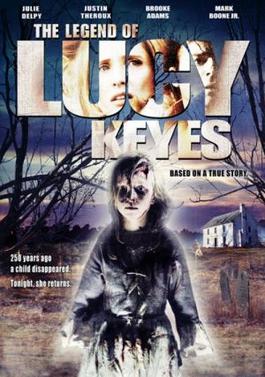
The Legend of Lucy Keyes is a 2006 suspense mystery film directed and written by John Stimpson, and starring Julie Delpy, Justin Theroux and Brooke Adams. The film premiered at the 2006 Santa Barbara Film Festival.

Dorothy Spencer, known as Dot Spencer, was an American film editor with 75 feature film credits from a career that spanned more than 50 years. Nominated for the Academy Award for Best Film Editing on four occasions, she is remembered for editing three of director John Ford's best known movies, including Stagecoach (1939) and My Darling Clementine (1946), which film critic Roger Ebert called "Ford's greatest Western".

Dragonwyck is a 1946 American period drama film made by Twentieth Century-Fox. It was directed by Joseph L. Mankiewicz, and produced by Darryl F. Zanuck and Ernst Lubitsch (uncredited), from a screenplay by Mankiewicz, based on the novel Dragonwyck by Anya Seton. The music score was by Alfred Newman, and the cinematography by Arthur C. Miller. The film stars Gene Tierney, Walter Huston, and Vincent Price.
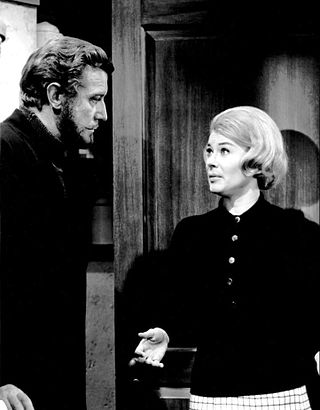
The Ghost & Mrs. Muir is an American sitcom based on the 1947 film of the same name, which was based on the 1945 novel by R. A. Dick. It premiered in September 1968 on NBC. After NBC cancelled the series at the end of its first season, it was picked up by ABC for its second season before being cancelled a final time.

Irene is a 1940 American musical film produced and directed by Herbert Wilcox. The screenplay by Alice Duer Miller is based on the libretto of the 1919 stage musical Irene by James Montgomery, who had adapted it from his play Irene O'Dare. The score features songs with music by Harry Tierney and lyrics by Joseph McCarthy.
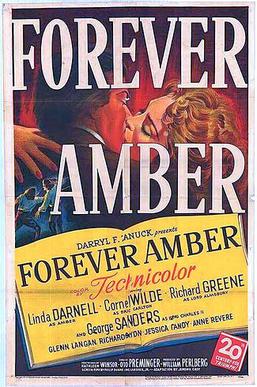
Forever Amber is a 1947 American adventure drama romance film starring Linda Darnell and Cornel Wilde. It was based on the book of the same title by Kathleen Winsor. It also starred Richard Greene, George Sanders, Glenn Langan, Richard Haydn, and Jessica Tandy.

Verna Martha Wentworth was an American actress. Her vocal variety led to her being called the "Actress of 100 Voices".
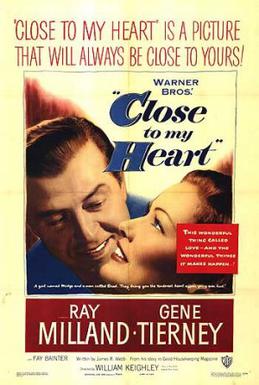
Close to My Heart is a 1951 American drama film directed by William Keighley, written by James R. Webb, and starring Ray Milland and Gene Tierney.

Piccadilly Incident is a 1946 British drama film directed by Herbert Wilcox and starring Anna Neagle, Michael Wilding, Coral Browne, Edward Rigby and Leslie Dwyer.



















